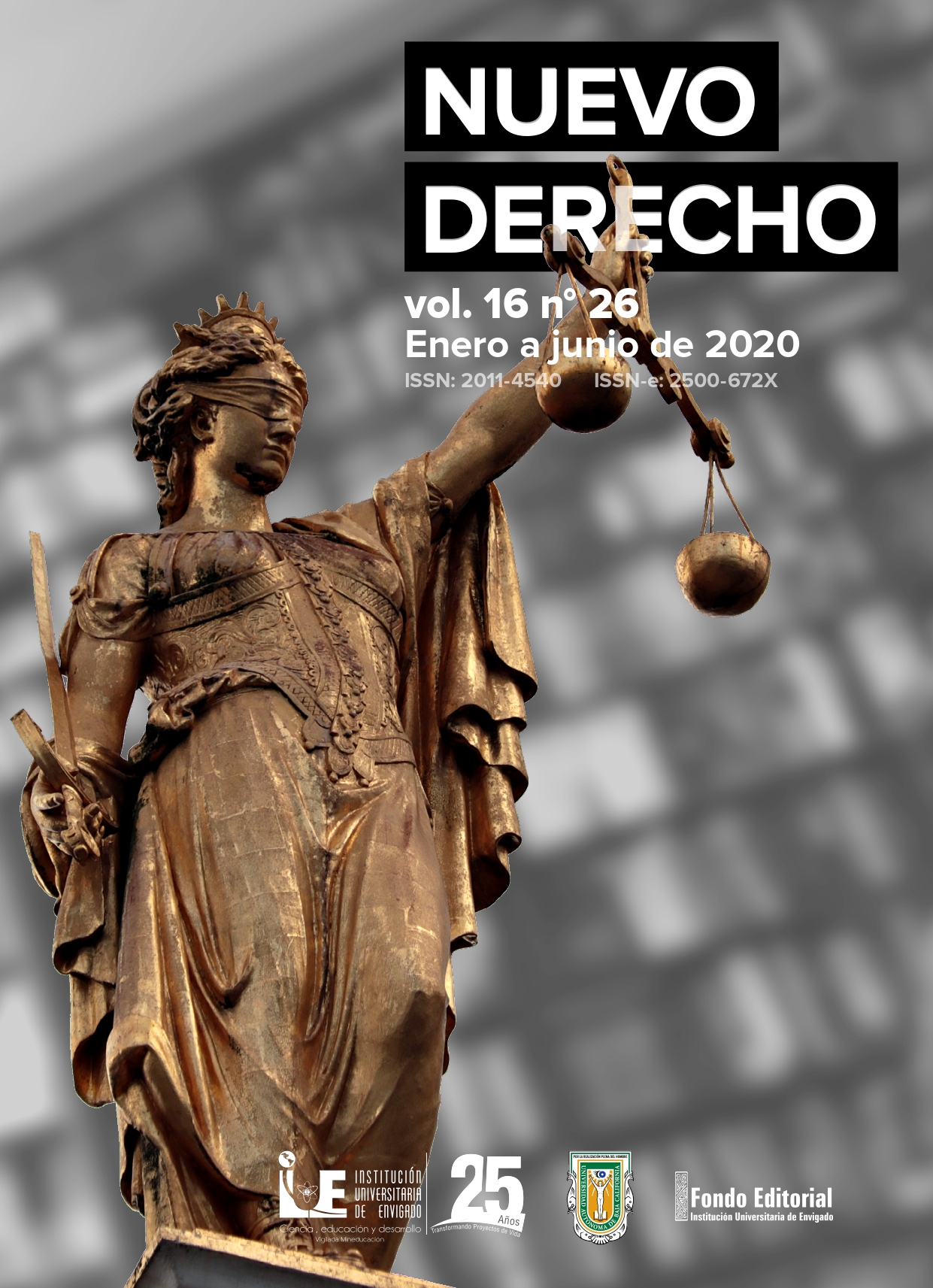Origins of presidentialism in Colombia: the construction of a new order
DOI:
https://doi.org/10.25057/2500672X.1339Keywords:
presidentialism, political system, Constituent Assembly, Exception status, Site statusAbstract
Colombian political thought during the 19th century was characterized by interpretative and ideological schemes from Europe and North America with the
It was intended to generate the construction of a developed and modern nation-state.
The system of government chosen by the legal elite of the time was presidentialism, taking the model of the United States, which has been the system of government in force in the country since that time. Presidentialism in Colombia has not been a static system and, on the contrary, changes and modifications in it can be traced throughout two hundred years of republican life. This article reflects on the origins of presidentialism in Colombia, from the historical and constitutional scope of the figure. The understanding of presidentialism since the constitution of 1886 and the
The way in which it is legally and politically configured in the 1991 constitution, also on the exercise of the powers of the president of the republic and their relationship
with the legislature. The historical and constitutional context of this figure is then analyzed in terms of the powers of the president and the way in which the system of checks and balances is developed for the Colombian case from the interaction of the different institutions of the executive, legislative, and judicial order. .
References
Asamblea Nacional Constituyente. (1991). Constitución Política de Colombia. Gaceta Constitu-cional No. 116 del 20 de julio de 1991. Bogotá.
Asamblea Nacional Constituyente. (1991). Constitución Política de Colombia. Bogotá: Gaceta Constitucional No. 127 de 10 de octubre de 1991.Colombia.
Aguilera, M. (1997). La designatura presidencial: una genuina institución colombiana. Creden-cial Historia, (94). Recuperado de: https://www.banrepcultural.org/biblioteca-virtual/creden-cial-historia/numero-94/la-designatura-presidencial
Amador. S (2005) El camino de la constitución de 1991: Diario de la exclusión. Poder Constitu-yente, conflicto y constitución en Colombia. p 87-120.
Bermúdez. M. (2010). La Ley De Los Caballos. Globedia. Recuperado de http://co.globedia.com/la-ley-de-los-caballos.
Bidart. G. (1993). Dogmática constitucional de los derechos humanos. Ius Et Veritas, pp. 9-25.Colombia.
Congreso de la República. (2009). Ley 1354. Bogotá: Diario Oficial: 47.466 de 8 de septiembre de 2009.Colombia.
Congreso General. (1821). Constitución 1. Cúcuta. Recuperado de https://www.funcionpublica.gov.co/eva/gestornormativo/norma.php?i=13690Colombia.
Corte Constitucional. (1992). Sentencia C-544. Magistrado Ponente: Alejandro Martínez Caballero. Bogotá: Gaceta Constitucional.Colombia.
Corte Constitucional (1995). Sentencia C-466. Magistrado Ponente: Carlos Gaviria Diaz. Bogotá: Gaceta Constitucional.Colombia.
Corte Constitucional (2005). Sentencia C-1040. Magistrados Ponentes: Manuel Jose Cepeda Espinosa, Rodrigo Escobar Gil, Marco Gerardo Monroy Cabra, Humberto Sierra Porto, Álvaro Tafur Galvis y Clara Inés Vargas Hernández. Bogotá: Gaceta Constitucional.Colombia.
Corte Constitucional. (2010). Sentencia C-141. Magistrado Sustanciador: Humberto Sierra Porto. Bogotá: Gaceta Constitucional.
Echavarría, P. (2012). Sistema-Mundo, colonialidad del poder y decisionismo en la formación del estado en Colombia en la segunda mitad del siglo XIX. (Tesis de grado). Universidad de Cartagena, Cartagena.
Pérez, A., Espinosa, X. Orígenes del presidencialismo en Colombia: la construcción de un nuevo ordenNuevo Derecho, Vol. 16, No. 26, enero - junio de 2020, pp. 1-13. ISSNe: 2500-672X. Envigado–Colombia13
Garcés, P. (2008). Pervivencia del Pensamiento Kelseniano. Revista Nuevo Derecho (3), 19-34. Recuperado de http://revistas.iue.edu.co/revistasiue/index.php/nuevoderecho/article/view/230
Garcé, A. (2017). Hacia una teoría ideacional de la difusión institucional. La adopción y adap-tación del presidencialismo en América Latina durante el siglo XIX. Revista Española de Ciencia Política, (44), 13-41.
Guerrero, G. (s. f.). La educación colombiana en la segunda mitad del siglo XIX (Del Modelo Educativo Laico Y Utilitarista Al Modelo Catolico-Tradicional). Recuperado de http://ceilat.udenar.edu.co/wp-content/uploads/2011/03/La-Educaci%C3%B3n-Colombiana-en-la-Se-gunda-Mitad-del-Siglo-XIX.pdf
Negretto, G. (2013). Los orígenes del presidencialismo en América Latina: un estudio sobre el proceso constituyente argentino (1853-1860). Revista Latinoamericana de Política Compa-rada, (7), 127-168.
Osuna, N. I. (2016). La Presidencia de la República: una institución fuerte en un Estado débil. Revista Credencial Historia. Recuperado de: http://www.revistacredencial.com/credencial/historia/temas/la-presidencia-de-la-republica-una-institucion-fuerte-en-un-estado-debil
Pescador, J. (2012). Presidencialismo en Colombia: atenuación, persistencia y agudización (1991-2010). (Tesis de grado). Universidad Colegio Mayor de Nuestra Señora del Rosario, Bogotá. Recuperado de https://repository.urosario.edu.co/bitstream/handle/10336/4912/PescadorZambrano-JuanDavid-2013.pdf?sequence=3&isAllowed=y
Quinche, M. (2013). El presidencialismo, el control de convencionalidad y la democracia en los países andinos. Revista Co-herencia, 10(19), 167-206.
Rolla, G. (2012). La evolución del constitucionalismo en américa latina y la originalidad de las experiencias de justicia constitucional. Anuario Iberoamericano de Justicia Constitucional,(16), 329-351.
Uprimny, R. (25 de mayo de 2010). El centenario de la reforma constitucional de 1910. El Espectador. Recuperado de https://www.elespectador.com/opinion/el-centenario-de-la-refor-ma-constitucional-de-1910-columna-193216
Wills, M. (2000). De la nación católica a la nación multicultural: rupturas y desafíos. En Restrepo, E. Museo, Memoria y Nación (pp. 385 – 415). Bogotá: Ministerio de Cultura, PNUD, IEPRI, ICANH.
How to Cite
Downloads
Languages:
esDownloads
Published
Versions
- 2020-07-27 (3)
- 2020-07-27 (1)
Issue
Section
License
Authors should declare that the article is an original work that has not been totally or partially published in any print or electronic media, which has not been submitted simultaneously to another publication and that is not currently under evaluation in another publication. On the other hand, I leave (we) evidence that the statements made therein are the sole responsibility of the / the authors / is.
All data and references to already published material are properly identified with their respective credit and included in the bibliographical notes and appointments that stand out as such and, in cases that require it, I have the proper authorizations for those with the respective rights; in case of any dispute or claim relating to intellectual property rights, we take responsibility exonerating responsibility to Nuevo Derecho.
If the article is approved for publication, the authors transfer the copyright to the journal New law to publish, distribute electronic copies and included in indexing services, directories or databases of national and international data on Open Access under the Creative Commons 3.0 Attribution-Noncommercial (CC bY-NC-SA) by which the authors retain their copyrights and allow them to others copy and distribute your work provided they recognize the corresponding authorship and the work is not used for purposes commercial.
Therefore, new law does not retain the rights to reproduce or copy (copyright), so the authors will have the final versions, to disseminate them in institutional repositories, personal blogs or any other electronic or print media, with the sole condition to make mention of the original source of publication, in this case Nuevo Derecho.
| Article metrics | |
|---|---|
| Abstract views | |
| Galley vies | |
| PDF Views | |
| HTML views | |
| Other views | |





